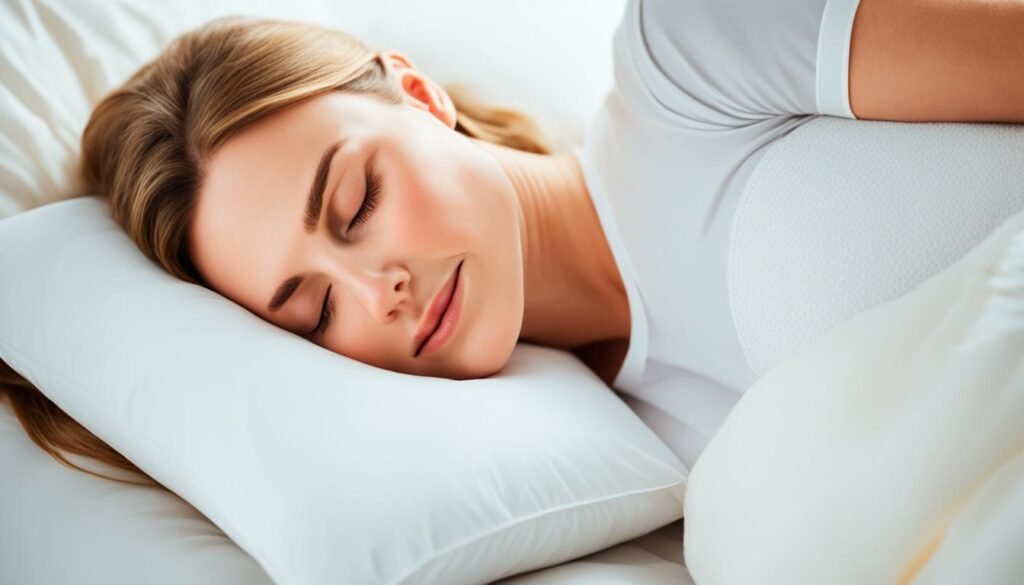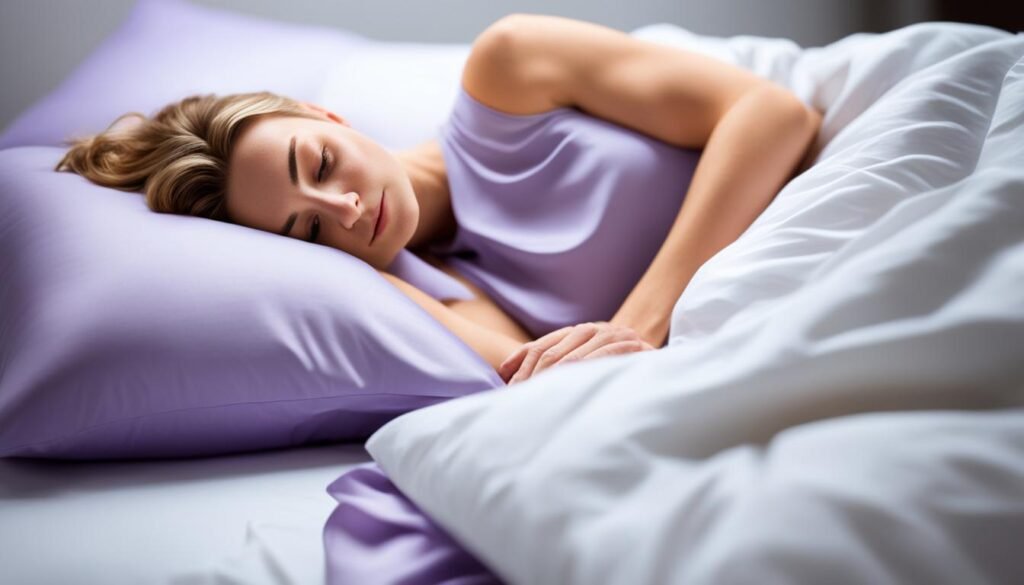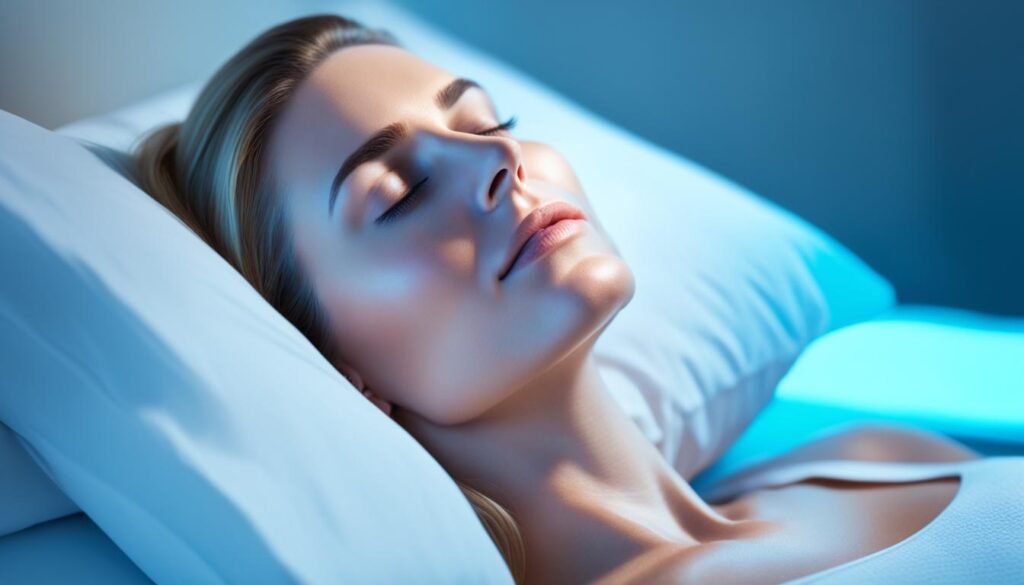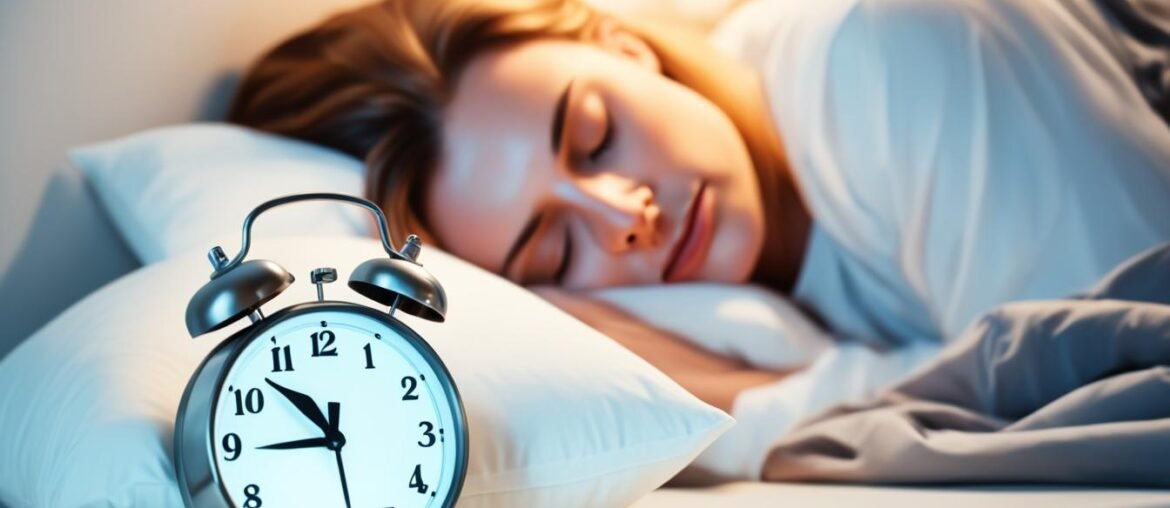Did you know that getting a poor night of sleep can have a direct impact on the health and appearance of your skin? Research has shown that sleep deprivation can lead to various negative effects, including hanging eyelids, swollen eyes, darker undereye circles, paler skin, more wrinkles and fine lines, and droopy corners of the mouth.
On the other hand, getting a full night of adequate sleep can work wonders for your skin. It not only rejuvenates the skin but also improves blood flow, rebuilds collagen, and repairs damage caused by UV exposure. Prioritizing healthy sleep habits can be a game-changer when it comes to maintaining youthful and vibrant skin.
Key Takeaways:
- Adequate sleep plays a crucial role in antiaging skin care
- Poor sleep quality can accelerate the aging process of the skin
- Getting enough sleep improves blood flow, collagen production, and repair mechanisms
- Skincare practices before bedtime can enhance the quality of sleep
- Proper hydration and protecting the skin from sun damage are crucial for healthy skin
The Importance of Sleep for Skin Health
Sleep is a fundamental aspect of overall health, and its benefits extend to skin health as well. While we often focus on skincare products and treatments, the role of a good night’s sleep should not be overlooked. Getting sufficient sleep is essential for maintaining healthy and glowing skin.
During sleep, the body undergoes a process of repair and rejuvenation, and the skin is no exception. When we sleep, blood flow to the skin increases, providing essential nutrients and oxygen that promote optimal skin health. This improved blood circulation allows for better collagen production, which helps firm the skin and reduce the appearance of wrinkles and age spots.
Furthermore, sleep provides an opportunity for the skin to recover from environmental stressors it encounters during the day. It’s the ideal time for the skin to repair any damage caused by exposure to the sun’s harmful rays. Adequate sleep allows the skin to restore its natural barrier function, keeping it hydrated and protecting it from external aggressors.
“A good night’s sleep is like a mini-facial, nourishing and replenishing the skin from within.”
By prioritizing quality sleep, you can experience a range of benefits for your skin. These include:
- Improved collagen production for firmer, more youthful-looking skin
- Reduced appearance of wrinkles, fine lines, and age spots
- Enhanced skin hydration and a healthier skin barrier
- Repair and rejuvenation of skin cells
- Decreased inflammation and redness
Ensuring you get adequate sleep is as important as using skincare products and following a skincare routine. It’s an integral part of a holistic approach to skin health.
The Beauty Benefits of Beauty Sleep
Quality sleep has a direct impact on your skin’s appearance. It can give you that coveted “glow” and contribute to a more youthful and radiant complexion. While external factors like pollution, stress, and aging can take a toll on your skin, the power of sleep can help counteract these effects.
| Sleep Benefits for Skin | How It Helps |
|---|---|
| Improved blood flow | Promotes collagen production, reduces wrinkles |
| Repair and rejuvenation | Repairs damage caused by environmental stressors |
| Enhanced hydration | Maintains skin barrier integrity, prevents dryness |
| Reduced inflammation | Calms redness and skin irritation |
As you can see, sleep plays a crucial role in maintaining skin health and achieving a beautiful complexion. It’s not just a matter of looking well-rested; it’s about giving your skin the opportunity to heal, regenerate, and function optimally.
In the next section, we will explore the impact of sleep on the aging process of the skin and how getting enough sleep can help you maintain a more youthful appearance.
The Impact of Sleep on Skin Appearance

Poor sleep quality can accelerate the aging process of the skin, leading to premature aging signs such as wrinkles, fine lines, and dullness. On the other hand, quality sleep can help maintain a more youthful appearance. Research has shown that good sleepers have lower scores of intrinsic skin aging, better barrier recovery after tape stripping, and better recovery from erythema caused by exposure to UV light. Taking care of your sleep can contribute to maintaining a more youthful and vibrant complexion.
As we age, our skin undergoes various changes that can be influenced by our lifestyle habits, including sleep quality. Lack of sleep or poor sleep quality can have detrimental effects on the health and appearance of your skin. When we don’t get enough sleep, our body produces more cortisol, a stress hormone that can break down collagen, the protein responsible for maintaining the skin’s elasticity and smoothness. This can result in the formation of wrinkles, fine lines, and sagging skin.
Additionally, inadequate sleep can impair the skin’s ability to repair and regenerate itself. During sleep, our body goes through a process of cellular repair and renewal, including the restoration of skin cells. Without enough sleep, this process is disrupted, leading to a dull, tired-looking complexion.
On the other hand, getting sufficient, high-quality sleep can have a positive impact on the appearance of your skin. During sleep, blood flow to the skin increases, delivering vital nutrients and oxygen that promote healthy cell turnover and collagen production. This can result in a more youthful, glowing complexion.
“Adequate sleep is essential for maintaining the health and appearance of your skin.”
Furthermore, sleep has been found to play a crucial role in skin barrier function. The skin barrier acts as a protective shield, preventing the loss of moisture and protecting against environmental aggressors. Research has shown that poor sleep quality can compromise the skin barrier, leading to increased transepidermal water loss and a weakened defense against harmful external factors.
By prioritizing good sleep habits and ensuring that you get the recommended 7 to 9 hours of quality sleep each night, you can help maintain a more youthful and vibrant complexion. Investing in your sleep is an investment in your skin’s health and appearance.
Skincare Tips for Better Sleep
Incorporating simple skincare practices into your nighttime routine can improve the quality of your sleep and benefit your skin. Start by washing your face before turning in to remove dirt, makeup, and excess oil that can clog pores and cause skin issues.
Using an overnight moisturizer can help hydrate your skin and prevent dryness while you sleep. Look for products that are specifically formulated to provide deep hydration and nourishment, allowing your skin to replenish and repair itself overnight.
Consider adjusting your sleep position to optimize your skin health. Sleeping on your back is recommended, as it can minimize skin irritation and prevent the formation of sleep lines and wrinkles. If you prefer sleeping on your side, invest in a special pillowcase made from smooth, skin-friendly fabrics such as satin or silk. These fabrics reduce friction and minimize pressure on your face, preventing skin irritation and the formation of sleep wrinkles.
Creating a healthy sleep environment is crucial for both your sleep quality and skin health. Keep your bedroom dark and avoid direct exposure to sunlight while you sleep. Consider using blackout curtains or an eye mask to block out any sources of light that can disrupt your sleep patterns and contribute to skin issues.
Additionally, maintaining a consistent bedtime skincare routine can signal your body that it’s time to wind down and prepare for sleep. Incorporate calming activities into your evening ritual, such as gentle stretching or reading a book, to promote relaxation and prepare your mind and body for restful sleep.
Remember, taking care of your skin during the night doesn’t have to be complicated. By following these simple skincare tips, you can enhance the quality of your sleep and wake up to healthier, more rejuvenated skin.
The Role of Hydration in Skin Health
Proper hydration is crucial for maintaining overall health and the health of your skin. When you sleep, your skin can become dehydrated, especially in low-humidity environments. To combat this, it’s essential to use an overnight moisturizer that helps retain moisture and keeps your skin hydrated while you sleep.
An overnight moisturizer works by creating a protective barrier on the skin, preventing water loss and sealing in moisture. Look for moisturizers that contain ingredients like hyaluronic acid, glycerin, or ceramides, as they are effective in maintaining hydration levels and preventing dryness. Applying an overnight moisturizer before bed allows it to penetrate deeply into your skin, leaving you waking up with a nourished and hydrated complexion.
In addition to using an overnight moisturizer, staying hydrated throughout the day is also essential for healthy skin. Drinking an adequate amount of water helps to improve overall skin health and appearance. When you are dehydrated, your skin can become dry, dull, and prone to wrinkles. By staying hydrated, you can help maintain the elasticity and plumpness of your skin.
Remember, the key to healthy skin is a combination of internal and external hydration. So, don’t forget to moisturize your skin from within by drinking enough water throughout the day.
Hydration is a vital aspect of skincare that should not be overlooked. Using an overnight moisturizer and staying hydrated can contribute to a radiant, youthful complexion. Take care of your skin by incorporating these hydrating practices into your skincare routine.
The Position of Sleep and Skin Health

The position in which you sleep can have a significant impact on the health and appearance of your skin. While many factors contribute to maintaining skin health, the sleep position you prefer can play a role in minimizing skin irritation and reducing the chances of developing wrinkles.
Sleeping on your back is generally considered the best position for skin health. When you sleep on your back, your face avoids direct contact with a pillow, reducing the likelihood of wrinkles forming. This sleep position also minimizes the compression and friction against your skin, which can lead to irritation and skin issues over time.
If sleeping on your back isn’t comfortable for you, there are still ways to protect your skin. Consider using a pillowcase made of skin-friendly materials such as satin or silk. These fabrics are smoother and gentler on the skin, reducing the risk of skin irritation and compression marks during sleep.
Another option to consider is using a copper-oxide pillowcase. Copper has been shown to have antioxidant and anti-aging properties, and using a pillowcase infused with copper can potentially help reduce the appearance of fine lines and wrinkles while you sleep.
Ultimately, finding the right sleep position and using a suitable pillowcase can contribute to maintaining healthier skin and reducing the signs of aging over time.
Benefits of Sleeping on Your Back:
- Minimizes skin irritation and friction
- Reduces the likelihood of wrinkles caused by pressing your face against a pillow
- Avoids compression and potential skin issues
Materials for Skin-Friendly Pillowcases:
- Satin
- Silk
Copper-Oxide Pillowcase:
A pillowcase infused with copper can help promote healthier skin and potentially reduce the appearance of fine lines and wrinkles. Copper has antioxidant properties and may contribute to skin rejuvenation.
The Benefits of Elevating Your Head
Elevating your head while you sleep can do wonders for your overall health and the appearance of your skin. Not only does it help reduce common sleep disturbances like snoring, acid reflux, and nasal drip, but it also offers specific benefits for your skin. By elevating your head, you can effectively reduce bags and circles under your eyes, giving you a refreshed and rejuvenated look.
When you sleep with your head elevated, it improves blood flow and prevents blood from pooling in the sensitive under-eye area. This reduction in blood pooling helps minimize puffiness, bags, and dark circles under your eyes, making you look more awake and revitalized.
Furthermore, elevated head positioning allows lymphatic fluid to drain more efficiently. The lymphatic system plays a crucial role in removing toxins and waste products from your body, including the area around your eyes. By improving lymphatic drainage, elevating your head can help reduce fluid retention and diminish the appearance of under-eye bags.
There are several methods to elevate your head while you sleep. You can use extra pillows to prop up your head and upper body, creating a gentle incline. Alternatively, adjustable beds and specialized wedge-shaped pillows can provide the perfect angle for optimal elevation.
Remember, maintaining a consistent and comfortable position is essential for reaping the benefits. It’s crucial to find the method that works best for you and ensures a comfortable and restful night’s sleep.
The Role of Sun Exposure in Skin Health

Direct sun exposure can pose risks to your skin’s health and appearance, even while you sleep. Sleeping with your skin directly exposed to the sun can lead to damage and increase the risk of developing skin issues. It’s important to stay away from sun exposure while you snooze to protect your skin and promote better sleep.
Using blackout curtains or ensuring that your bed is not in direct line with the sun can help protect your skin from harmful UV rays. This simple step can help prevent skin damage and decrease the chances of developing sunspots, wrinkles, and other signs of sun-related skin aging.
Embracing Healthy Sleep for Healthy Skin

Prioritizing healthy sleep habits is essential for maintaining the health of your skin. While skincare products and treatments can be helpful, they should not be the sole focus of your efforts. Paying attention to how you treat your skin during sleep hours is equally important. Embracing healthy sleep practices can contribute to the overall health and appearance of your skin for years to come.
When it comes to maintaining skin health, getting enough sleep is crucial. Lack of sleep can lead to various skin issues such as dryness, dullness, and breakouts. On the other hand, healthy sleep habits can support your skin by promoting the production of collagen, improving blood circulation, and enhancing the natural repair process.
A key factor in achieving healthy sleep is establishing a consistent sleep schedule. Going to bed and waking up at the same time every day helps regulate your body’s internal clock and promotes better sleep quality. Additionally, creating a calming bedtime routine can signal to your body that it’s time to unwind and prepare for sleep.
Creating a sleep-friendly environment can also contribute to healthy skin. Keep your bedroom cool, dark, and quiet to optimize sleep conditions. Invest in a comfortable mattress and pillows that support your body and don’t cause unnecessary pressure on your face, reducing the risk of wrinkles and irritation.
It’s also essential to establish good sleep hygiene practices, such as avoiding caffeine and stimulating activities before bed. Instead, engage in relaxing activities like reading a book or taking a warm bath to help you wind down. Limit screen time, as exposure to blue light from electronic devices can disrupt your sleep patterns.
Incorporating skincare into your nighttime routine is another important aspect of maintaining skin health during sleep. Start by cleansing your face to remove dirt, oil, and makeup that can clog pores and lead to breakouts. Follow up with a moisturizer that suits your skin type to keep it hydrated throughout the night. Consider using products with ingredients like retinol or hyaluronic acid, known for their skin-rejuvenating properties.
“A good night’s sleep is essential for healthy skin. During sleep, the body repairs and rejuvenates itself, leading to a refreshed and radiant complexion.”
Remember to pay attention to your sleeping position as well. Sleeping on your back is considered the best position for skin health, as it minimizes contact between your face and the pillow, reducing the risk of wrinkles and blemishes. If you prefer to sleep on your side, using a silk or satin pillowcase can help reduce friction and prevent sleep lines.
In conclusion, prioritizing healthy sleep habits is crucial for maintaining the health and appearance of your skin. By establishing a consistent sleep schedule, creating a sleep-friendly environment, and incorporating skincare into your nighttime routine, you can embrace healthy sleep habits that contribute to your overall skin health. Remember, a good night’s sleep is not only essential for feeling rested; it also plays a vital role in maintaining healthy, youthful-looking skin.
Tips for Getting More Beauty Sleep
To optimize your beauty sleep, it’s important to practice good sleep hygiene. Here are some tips to help you get more quality sleep and wake up feeling refreshed:
- Maintain a regular sleep schedule: Try to go to bed and wake up at the same time every day, even on weekends. This helps regulate your body’s internal clock and promotes better sleep.
- Create a quality sleep environment: Make sure your bedroom is cool, dark, and quiet. Use blackout curtains, earplugs, or a white noise machine to block out any disturbances that might disrupt your sleep.
- Exercise regularly: Engaging in regular physical activity can promote better sleep. However, avoid intense workouts close to bedtime, as they can increase alertness and make it harder to fall asleep.
- Wind down before bed: Establish a relaxing pre-sleep routine to signal to your body that it’s time to sleep. This can include activities like reading a book, taking a warm bath, practicing relaxation techniques, or listening to calming music.
- Avoid electronics before bed: The blue light emitted by electronic devices can interfere with sleep. Try to disconnect from screens at least 30 minutes before bedtime to help your body prepare for sleep.
- If you find yourself lying awake in bed: If you’re unable to fall asleep after 20 minutes, it’s better to get out of bed and engage in a calming activity in another room. This helps break the association between your bed and insomnia, allowing you to return to bed when you feel sleepy again.
By following these tips and making sleep a priority, you can enhance the quality of your beauty sleep and reap the benefits for your overall health and skin. Sweet dreams!
Conclusion
Adequate sleep is a vital component of antiaging skin care. The importance of sleep for skin health cannot be overstated. It is not just about feeling rested; it also plays a crucial role in promoting skin rejuvenation and repair. When you prioritize healthy sleep habits and incorporate simple skincare practices into your routine, you unlock the transformative power of rest and enjoy the benefits of a youthful and radiant complexion for years to come.
Research has shown that getting a poor night of sleep can lead to various negative effects on the skin, including hanging eyelids, swollen eyes, darker undereye circles, paler skin, more wrinkles and fine lines, and droopy corners of the mouth. On the other hand, getting a full night of sleep can rejuvenate the skin, improving blood flow, rebuilding collagen, and repairing damage caused by UV exposure.
To maintain healthy skin, it is essential to ensure that you get enough sleep. Prioritizing good sleep hygiene, such as maintaining a regular sleep schedule and creating a quality sleep environment, can contribute to overall skin health. Additionally, incorporating simple skincare practices like washing your face before bed, using an overnight moisturizer, and avoiding direct sun exposure while you sleep can further enhance the benefits of beauty sleep.
By understanding the importance of sleep for skin health and proactively embracing healthy sleep habits, you can take control of your antiaging skincare routine. Remember, it’s not just about what you do during the day; it’s also about the rejuvenating power of a good night’s sleep. So, prioritize your beauty sleep and start enjoying the incredible benefits it brings to your skin and overall well-being.
FAQ
What role does sleep play in antiaging skin care?
Adequate sleep is crucial for maintaining healthy, youthful skin. During sleep, the skin’s blood flow increases, promoting collagen production and reducing wrinkles and age spots. Sleep also allows the skin to recover from external stressors and repair damage caused by sun exposure.
How does poor sleep quality affect the aging process of the skin?
Poor sleep quality can accelerate skin aging, leading to wrinkles, fine lines, and dullness. On the other hand, quality sleep helps maintain a youthful appearance and contributes to improved skin health.
What skincare practices can improve the quality of sleep and benefit the skin?
Incorporating simple skincare practices into your nighttime routine can improve sleep quality and benefit the skin. This includes washing your face before bedtime, using an overnight moisturizer, sleeping on your back or using a skin-friendly pillow, and keeping your bedroom dark.
How does proper hydration affect skin health during sleep?
Proper hydration is important for both overall health and skin health. Sleep can dehydrate the skin, so using an overnight moisturizer can help retain moisture and keep the skin hydrated. Staying hydrated by drinking water throughout the day also improves skin health and appearance.
Does the position in which we sleep impact our skin?
Yes, the position in which you sleep can impact your skin. Sleeping on your back is considered the best position for skin health, as it minimizes skin irritation and reduces the chances of wrinkles forming from pillow compression. Using a skin-friendly pillow or satin/silk pillowcase can also help minimize skin irritation.
What are the benefits of elevating your head while sleeping?
Elevating your head while you sleep can reduce snoring, acid reflux, and nasal drip, which can disturb sleep quality. It also improves blood flow and prevents blood from pooling, reducing bags and dark circles under the eyes.
Can sun exposure affect the skin’s health while sleeping?
Yes, direct sun exposure while sleeping can pose risks to the skin’s health and appearance. It can lead to damage and increase the risk of developing skin issues. Using blackout curtains or ensuring that your bed is not directly in line with the sun can help protect your skin and promote better sleep.
How important are healthy sleep habits for maintaining skin health?
Healthy sleep habits are essential for maintaining skin health. While skincare products and treatments are helpful, healthy sleep practices are equally important. They contribute to overall skin health and appearance for long-term benefits.
What are some tips for getting more beauty sleep?
To optimize your beauty sleep, practice good sleep hygiene. This includes maintaining a regular sleep schedule, creating a quality sleep environment, exercising regularly but avoiding intense workouts close to bedtime, winding down in the evening with calming activities, and putting away electronics before bed.
How does sleep contribute to antiaging and overall skin health?
Adequate sleep is a vital component of antiaging skin care. It promotes skin rejuvenation, repairs damage caused by environmental factors, and supports overall skin health. Prioritizing healthy sleep habits and incorporating simple skincare practices can unlock the transformative power of rest and lead to a youthful and radiant complexion.




